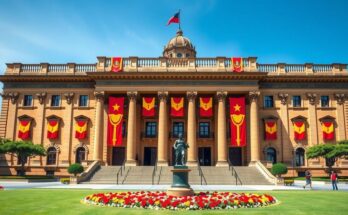Mauritius held its elections on November 10, 2024, aiming to re-elect the ruling party led by Prime Minister Pravind Jugnauth. Despite facing criticism over a temporary social media ban following a wiretapping incident, the elections involved about 1 million registered voters competing for 62 parliamentary seats, signifying the importance of democratic processes in this prosperous African island nation.
On Sunday, November 10, 2024, citizens of Mauritius participated in a significant electoral event aimed at selecting a new Parliament. The ruling party, led by Prime Minister Pravind Jugnauth, is seeking to secure a second five-year term amid a backdrop of recent controversies, including a temporary ban on social media arising from a wiretapping scandal. Approximately 1 million voters were registered for this 12th election since Mauritius gained independence from Britain in 1968, showcasing the importance of democratic participation in one of Africa’s most stable democracies. Prime Minister Pravind Jugnauth cast his vote in Port Louis, alongside prominent opponents such as Navin Ramgoolam, leader of the Labour Party, and former Prime Minister Paul Berenger of the Mouvement Militant Mauricien (MMM). Jugnauth’s government has faced scrutiny for its handling of the ban, which was lifted after a few days but raised concerns among opposition leaders and civil society groups. The ruling Militant Socialist Movement, which dominated the 2019 elections, is competing against Ramgoolam’s Alliance for Change. Mauritius, located approximately 2,000 kilometers off the east coast of Africa, has maintained a robust economy supported by sectors such as finance, tourism, and agriculture. The island is distinguished by its scenic beaches and ranks second in Africa, following Seychelles, on the Human Development Index. This index evaluates quality of life factors, including life expectancy, education accessibility, and per capita income, highlighting Mauritius’s successful post-independence development. The World Bank has lauded Mauritius as a model of success for sub-Saharan Africa, achieving notable economic growth over the years, despite challenges such as the COVID-19 pandemic’s impact on tourism. During this electoral event, individuals will vote for a total of 62 parliamentary seats, with the majority party or coalition responsible for forming a government and appointing a prime minister. An additional eight lawmakers are nominated by the Electoral Supervisory Council, adding to the democratic framework established in the nation. As Mauritius undergoes this electoral process, the outcome will not only determine the immediate political landscape but also impact the broader regional dynamics in Africa, where over 50 nations are set to hold elections in 2024.
Mauritius, an island nation situated in the Indian Ocean, has a rich history of stable democratic governance since achieving independence from Britain in 1968. The political landscape is characterized by a multi-party system, with significant parties including the Militant Socialist Movement led by Pravind Jugnauth and the Labour Party led by Navin Ramgoolam. The country has garnered international recognition for its economic achievements and advanced quality of life indicators compared to other nations in the region. Recently, governance has been challenged by social media regulations and incidents that have stirred public discourse, underscoring the delicate balance between security and civil liberties in democratic societies. The October 2024 election is pivotal as it consolidates or challenges existing leadership against a backdrop of socio-economic progress and upheaval.
In summary, the elections in Mauritius signal a crucial moment for both political and socio-economic trajectories of the nation. As voters participate in this democratic process, the contrasting ideologies of the ruling party and the opposition reflect the ongoing dialogue regarding governance, civil liberties, and the future direction of the island. With its established democratic framework and evolving societal issues, the election results will undoubtedly impact not only Mauritius but potentially influence broader regional political sentiments in Africa.
Original Source: apnews.com




